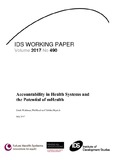| dc.contributor.author | Waldman, Linda | |
| dc.contributor.author | Reed, Philip | |
| dc.contributor.author | Hrynick, Tabitha | |
| dc.date.accessioned | 2017-07-03T15:07:59Z | |
| dc.date.available | 2017-07-03T15:07:59Z | |
| dc.date.issued | 2017-07 | |
| dc.identifier.citation | Waldman, L.; Reed, P. and Hrynick, T. (2017) Accountability in Health Systems and the Potential of mHealth, IDS Working Paper 490, Brighton: IDS | en |
| dc.identifier.isbn | 978-1-78118-376-2 | |
| dc.identifier.issn | 2040-0209 | |
| dc.identifier.uri | https://opendocs.ids.ac.uk/opendocs/handle/20.500.12413/13037 | |
| dc.description.abstract | The rapid spread of information and communication technologies (ICTs) (and of mobile
phones in particular) across low- and middle-income countries (LMICs) has generated
considerable excitement in development circles regarding their potential to revolutionise
service delivery in health systems. Broadly speaking, such innovations, widely referred to as mHealth, make possible new ways of collecting, collating and managing health and health service-related data, and novel means of communication between and among citizens, civil society, health service personnel and government actors. This can empower citizens to better understand, care and advocate for their own health; health workers to deliver improved services; and government actors to enforce or build health policies that uphold the health rights of all citizens, including poor and marginalised groups who are often systematically excluded from health systems.
As mHealth is in its infancy, and most projects to date have been small in scale, this potential is still being tested. Furthermore, most research has focused on the extent to which mHealth has improved service delivery and/or health outcomes in the short term. There has been little explicit attention given to whether and how mHealth might improve accountability for public health services – that is, to what extent mHealth can enhance citizens’ abilities to demand improved services from providers and government in line with their rights, and/or augment the capacity and willingness of providers and government to respond to citizens’ needs and demands – both in the short and the long term.
This Working Paper aims to begin to fill this gap by exploring literature on accountability in
health systems and on mHealth and to build theoretical and empirical bridges between them. In so doing, we lay out a clearer understanding of the role that mHealth can play in
accountability for public health services in LMICs, as well as its limitations. At the centre of
this role is technology-facilitated information which, for instance, can help governments
enforce and improve existing health policy, and which can assist citizens and civil society to
communicate with each other to learn more about their rights, and to engage in data
collection, monitoring and advocacy. Ultimately however, information, facilitated as it may be by mHealth, does not automatically lead to improved accountability. Different forms of health care come with different accountability challenges to which mHealth is only variably up to task. Furthermore, health systems, embedded as they are in diverse political, social and economic contexts, are extremely complex, and accountability requires far more than
information. Thus, mHealth can serve as a tool for accountability, but is likely only able to
make a difference in institutional systems that support accountability in other ways (both
formal and informal) and in which political actors and health service providers are willing and able to change their behaviour. | en |
| dc.description.sponsorship | Future Health Systems Research Programme Consortium | en |
| dc.description.sponsorship | Making All Voices Count | en |
| dc.description.sponsorship | United States Agency for International Development | en |
| dc.description.sponsorship | Swedish International Development Cooperation Agency | en |
| dc.description.sponsorship | Omidyar Network | en |
| dc.description.sponsorship | UK Department for International Development | en |
| dc.description.sponsorship | Economic and Social Research Council | en |
| dc.language.iso | en | en |
| dc.publisher | IDS | en |
| dc.relation.ispartofseries | IDS Working Paper;490 | |
| dc.rights | All rights reserved. Reproduction, copy, transmission, or translation of any part of this publication may be made only under the following conditions:
• with the prior permission of the publisher; or
• with a licence from the Copyright Licensing Agency Ltd., 90 Tottenham Court Road, London W1P 9HE, UK,
or from another national licensing agency; or
• under the terms set out below.
This publication is copyright, but may be reproduced by any method without fee for teaching or nonprofit purposes, but not for resale. Formal permission is required for all such uses, but normally will be granted immediately. For copying in any other circumstances, or for re-use in other publications, or for translation or adaptation, prior written permission must be obtained from the publisher and a fee may be payable. | en |
| dc.rights.uri | http://www.ids.ac.uk/files/dmfile/IDSOpenDocsStandardTermsOfUse.pdf | en |
| dc.subject | Health | en |
| dc.subject | Politics and Power | en |
| dc.subject | Technology | en |
| dc.title | Accountability in Health Systems and the Potential of mHealth | en |
| dc.type | IDS Working Paper | en |
| dc.rights.holder | IDS | en |
| dc.identifier.team | Health and Nutrition | en |
| rioxxterms.funder | Department for International Development | en |
| rioxxterms.funder | Economic and Social Research Council | en |
| rioxxterms.identifier.project | ES/J018651/1 | en |
| rioxxterms.identifier.project | ES/J018651/1 | en |
| rioxxterms.version | VoR | en |
| rioxxterms.funder.project | 205d8664-e7ca-4d45-b952-638e05a8d20f | en |
| rioxxterms.funder.project | 63e4a955-638a-46b4-859e-6886920977e3 | en |

